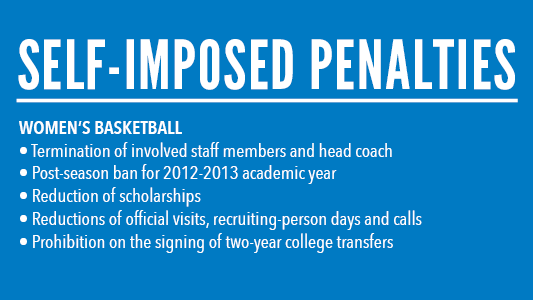NCAA announces penalties for Ole Miss women’s basketball

While the NCAA continues to investigate violations in the Ole Miss football team, the organization announced penalties for the women’s basketball program Friday. The infractions stem from activity in 2012 by former coaches.
According to the NCAA:
A former University of Mississippi women’s basketball assistant coach, a former director of basketball operations and two women’s basketball student-athletes acted unethically when they committed academic fraud to ensure the student-athletes were eligible to enroll at the university, according to a decision issued by a Division I Committee on Infractions panel. In addition, they each provided false and misleading information during the investigation. The former head women’s basketball coach failed to monitor the two staff members’ activities surrounding the two student-athletes’ online coursework.
Statement from Ole Miss Chancellor Jeffrey Vitter:
We regret the violations of NCAA bylaws in both programs and have taken several steps to prevent future violations. One of my first acts as chancellor was to seek a comprehensive external review of our athletics compliance function. The review was recently completed and has confirmed to me that our compliance systems are robust while offering recommendations for areas where we can and will improve. We are pursuing the implementation of the recommendations, and we believe in our strong athletics leadership team, which shares the values of the NCAA and Ole Miss.
Penalties and corrective actions imposed by the panel include:
- A three-year probation period from Oct. 7, 2016, through Oct. 6, 2019.
- Six-year show-cause orders for the former assistant basketball coach and the former director of basketball operations from Oct. 7, 2016, through Oct. 6, 2022. During that period, if either individual is employed by an NCAA school in an athletically related position, school officials must appear with the individual before a Committee on Infractions panel.
- A two-year show-cause order for the former head basketball coach from Oct. 7, 2016, through Oct. 6, 2018. Any NCAA school employing him in an athletically related position during that time must appear with him before a Committee on Infractions panel.
Self-imposed penalties by the university included:
- A reduction in the number of scholarships by two to 13 during the 2013-14 academic year.
- A reduction in official visits by four, from a total of 12 to eight, during the 2012-13 academic year and by two, from 12 to 10 total, during the 2013-14 academic year.
- A one-year postseason ban during the 2012-13 academic season.
- A reduction in women’s basketball recruiting-person days by 20, from 100 allowable days to 80, during the 2012-13 academic year.
- A prohibition of staff initiating phone calls with prospects and their families for eight weeks during the spring 2013 semester.
- A prohibition from signing two-year college transfer prospects during the 2012-13 and 2013-14 academic years.
Details of the violations
- The former women’s basketball head coach delegated recruiting and compliance responsibilities to the former assistant coach with little supervision. That action resulted in the former assistant coach and former director of basketball operations completing and submitting coursework for five online classes that two prospective student-athletes needed to complete their associate degrees.
- The former assistant coach paid for and enrolled one of the student-athletes in two summer online classes. She also instructed the other student-athlete to enroll in three online courses at three different schools. The former assistant coach and the former director of operations then completed all of the coursework for the three online courses for one student-athlete and the majority of the other student-athlete’s coursework. The former director of operations and assistant coach also arranged for an acquaintance to pose as a proctor for an exam required for one of the student-athletes. The proctor provided the exam in advance to the former assistant coach, who then forwarded the exam to another individual. The student-athlete received a grade on the exam; however, she admitted she did not go to the testing site and did not take the exam.
- During the investigation, the university found emails from the former director of operations to one of the student-athletes that included completed coursework. As the university reviewed the case, the emails began disappearing. It later found that the former director of operations deleted his personal emails related to the case and had logged in to the student-athlete’s junior college account and deleted emails related to the investigation.
- The former assistant coach and former director of operations violated NCAA ethical conduct rules when they arranged for the fraudulent academic credits, stated that they were not involved in the academic fraud and tried to cover up their activities. The two student-athletes acted unethically when they initially stated they completed their own coursework. One of the student-athletes also denied that the former assistant coach paid for her courses and in a later interview admitted to deleting text messages between herself and the former assistant coach.
- The former head coach failed to monitor the two staff members’ activities surrounding the two student-athletes’ coursework. The former head coach knew the two student-athletes faced academic challenges, but did not supervise his staff members in monitoring the student-athletes’ academic status. His lack of questioning, delegation and reliance on the former assistant coach and former director of operations allowed them to operate unchecked and commit academic fraud.

